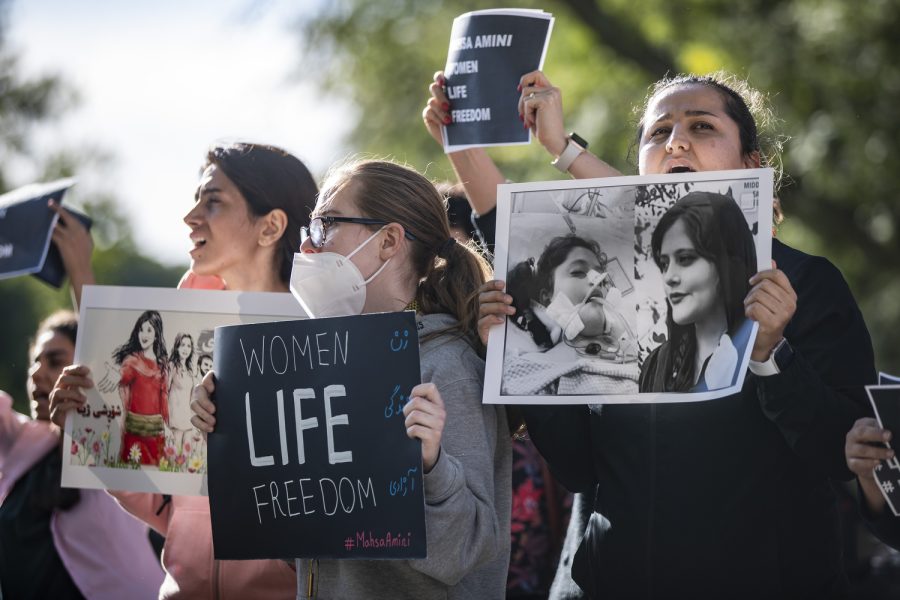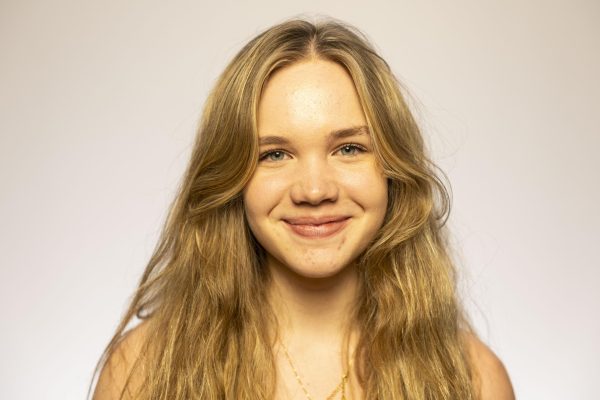Johnson County residents, UI students join Iran anti-government protesters
After the alleged killing of Iranian citizen Mahsa Amini, protests have broken out all over the world to stand against the strict dress code enforced on women in Iran. The University of Iowa’s Kurdish Students Organization held a protest at Hubbard Park to make their voices heard.
Protesters yell a chant during a demonstration aimed at standing in solidarity with Iranians at Hubbard Park in Iowa City on Monday, Sept. 26, 2022. About 30 people attended.
September 26, 2022
Members of Johnson County gathered at Hubbard Park on Monday to join thousands of Iranian protesters across the world after a movement against gender discrimination was launched in Iran over a week ago.
About 40 people attended the protest, which was created following the alleged killing of Mahsa Amini last week. The 22-year-old Kurdish Iranian woman was allegedly killed by the Iranian morality police for breaking the country’s dress code.
Mansour Golpour, a UI philosophy graduate student and member of the UI Kurdish Students Organization, organized and led the protest on Monday.
“[We are] in solidarity with the brave protests in Iran who have taken into the streets in a daring act of defiance,” he said in a speech at the protest. “The regime is harassing and ruminating on women daily, forcing them to abide by the strict Islamic dress codes.”
According to the Associated Press, Amini died from heavy blows to the head that caused a skull fracture. Her family believes the police were at fault for the alleged killing.
The morality police are responsible for enforcing the Islamic code of conduct in Iran. For Iranians living in Iowa City, they say arrest and violence toward women is all too familiar.
“Women are dragged away, beaten, and assaulted every single day in the cities and in the towns across Iran,” Golpour said. “In the eyes of the regime, women are the weakest members of society and transforming women into free propaganda signs doesn’t cost much.”
Golpour said at the protest that women are the ones at the very front of the protests burning their headscarves and protesting the dictatorship.
RELATED: Photos: Standing in solidarity with Iranian protesters
Frankline Matanji, a UI graduate fellow, said in an interview with The Daily Iowan that he attended the protest to stand in solidarity with his Iranian colleagues.
“I believe that people shouldn’t be forced to dress in whatever way,” he said. “Men shouldn’t take advantage just because they are masculine or stronger to infringe on women’s rights. I think that’s wrong.”
Farzana Sharmin Rimi, a Ph.D. student in the Human Toxicology Program at the University of Iowa and a U.S. citizen, originally from Bangladesh, 39, spoke to the crowd at the protest to spread her message: This isn’t just one case. Remi said women’s oppression in countries like Bangladesh and Iran is getting worse.
“You cannot go out at night. Why? Because you are a woman, you are weak,” she said to the protesters. “It wasn’t supposed to be like this. Don’t we deserve to live safely, freely as human beings as all other people in this world?”
Rimi said the enforcement of the hijab is not religious but a misinterpretation of the Islamic religion.
“The religion doesn’t force it on us, to see it for what we wear. Our society, our culture, is making this up in the name of religion,” she said. “We are getting attacked, and this means a big thing to us. We want people to come forward for a change in this issue.”
Shirin Vahidi, a UI graduate student, from Iran, attended the protest.
“My mother escaped Iran when I was a young child to take me away from the oppression and indoctrination that was happening to women and people all over the country,” she said in an interview with the DI. “Now I am here and I’m able to dress how I like and I’m able to pursue the education that I wish.”
Vahidi said she came to protest to fight for the chance that Amini wasn’t given. She wanted people to understand that the problem is not just in Iran; women’s rights are a concern all over the world, and they are an issue worth fighting for.
“I’m lucky to be here in America and be given the opportunities that I have and I hope soon everyone can, all over the world,” she said.















